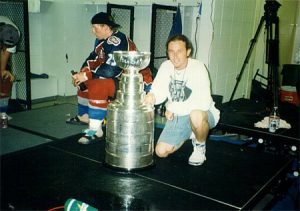We recently sat down with VP of Sports and Entertainment at Venuetize, Craig Duncan, who over the past month attended the Sports Data and Fan Engagement Summit and the MIT Sloan Sports Analytics conference. Craig has responsibility for the Sports and Entertainment (S&E) vertical at Venuetize, and has over 12 years of experience working with leading S&E organizations on how to best leverage mobile, data and analytics to drive deeper levels of fan engagement, sponsorship activation, and business profitability.
What were your top takeaways from the sports data and fan engagement conferences you attended over the last month?
First, it’s a great time to be a sports fan. The diversification of how we can now consume sports, whether digital or live, and the increasing combination of both at the same time, gives fans so many more affordable and enjoyable options than ever before. Secondly, there are so many new and exciting technology companies out there focused on enhancing the fan experience. This also creates a challenge for S&E businesses, to build a strategy and partner ecosystem that can deliver for today, but also is open to integrate new technologies in this rapidly changing tech landscape. Finally, if you don’t think eSports and the legalization of sports gambling are here for the long run, I would respectfully say you are wrong!

What do you think is the most interesting metric that sports teams are currently garnering from mobile app data specifically?
The fact that some teams are seeing usage of their mobile app as the number one indicator of season ticket holder renewals (for highest users), and churn (for lowest users), is extremely noteworthy considering the impact that season ticket holders have on a sports team’s business overall.
How would you assess the S&E mobile landscape as a whole based on what you are seeing at these type of S&E industry events and from your experience overall?
We are at a very exciting time in the world of mobile engagement for the sports and entertainment industry. Just five years ago, the infrastructure and technologies that enable so many of the ways we engage fans in personalized and useful ways were not available. The technology advancements over the last five years have dramatically changed the way sports and entertainment organizations run their business. More and more S&E organizations are running their business with a mobile-first approach in terms of fan engagement and experience.
I think the PGA TOUR is a great example of this. Eight years ago, phones were not allowed at PGA TOUR events. In 2011, the TOUR started allowing phones in certain areas at tournaments. In 2017, they changed their device policy to allow fans to take photos and video of on-course action during tournament rounds, which of course opens up to sharing on social media and so much more. As a result, they’ve been able to draw in a much younger demographic to their sport overall, which in turn opens the door to significant business opportunities, including mobile content monetization and new opportunities with prospective and current corporate sponsorship partners. In addition, fans are using their mobile devices onsite at PGA TOUR events for everything from mobile ticketing and payments to digital autographs, and so much more.
This all said, I believe we are only now just beginning to see the impact mobile will ultimately have on the sports and entertainment industry. The best is yet to come!
What is your advice for a sports and entertainment business when it comes to defining their mobile strategy?
First and foremost – have one. It’s a common mistake I see that sports and entertainment organizations are so focused on the current season and the ‘here and now’, that they don’t take time to map out their mobile strategy and how it impacts their key stakeholders not only for the current season, but going out at least three years.
I also strongly recommend building a mobile strategy that is truly fan-centric first. It is easy to say, but much more difficult to actually adhere to, with pressure usually coming from above to show immediate ROI on a technology investment. If you deliver a mobile experience to the end user that makes their lives easier and more enjoyable, they will engage with your brand at much deeper levels. Once you’ve built this trust at the fan/consumer level, app downloads and usage will increase dramatically and the monetization opportunities will quickly follow, along with measureable ROI. Pulling this off requires involvement and executive sponsorship from the very top of the organization.
What was the most interesting topic from your viewpoint over the two events?
In my opinion, the single most interesting storyline across sports business for 2018 is the legalization of sports gambling. It is no longer a matter of if it will happen, but when. You could really get a feel for how much momentum this development has at both events. When the short term monetary impact is measured in billions, and it directly impacts fan engagement, venue experience and so much more, I just think it’s a fascinating storyline from so many angles. I’m excited to see the role technology will have when it comes to empowering fans to gamble on sports events regardless of where they are. The new regulations will be interesting to see as they roll out, with laws most likely varying by state, which will only complicate how the on-the-go consumer is able to wager outside of a brick and mortar sportsbook. Mobile will play a huge role, as will the analytics aspect – where brands will be able to derive an enormous amount of data from legal gambling activity. I expect to see this topic gain even more traction, and a more prominent place on the agenda of these events and others in the coming years.







